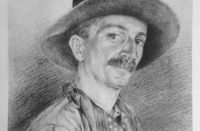The Long Walk!
Perhaps the most amazing example of all concerning German tenacity in the ‘new world’ is the story of Karl Deuffel. Eleven-year-old Karl left Germany in November 1854 with his parents aboard the Merbz, the first recorded ship to carry German immigrants to Queensland. Karl, his parents and his younger brother and sister were among 267 migrants destined for Nundah, the first free settlement in northern New South Wales (now a suburb of Brisbane).
Most of the passengers were friends and relatives from the Tauber Valley, recruited as labour for the wealthy squatters of the Darling Downs who were losing their traditional labour to the gold fields and were in need of agricultural workers. Many villagers had agreed to work for two years on the squatters’ land to pay for their passage.
The sea voyage was a nightmare. Food and water were rationed and the medical supplies inadequate. Before long, typhus and measles had taken hold of the ship and by March 1855, when it docked in Moreton Bay, forty-six people, including Karl’s mother, had died and had been tipped unceremoniously overboard.
The Deuffels arrived in the German mission settlement of Nundah grief struck and unable to speak English, with Karl’s father now seriously ill. He was taken to Brisbane’s convict hospital and died shortly after.
Karl, now twelve years old, was suddenly head of the household. Left to care for eight-year-old Andreas and three-year-old Amy, he decided to honour his father’s bond and hope that the squatters would accept his labour in place of his father’s. However, Tieryboo Station (now the township of Condamine), to which his father had been allocated, lay 350 kilometres west of Nundah, across the Great Divide. There were almost no white settlements along the way, an uneasy Aboriginal population and a host of natural hazards. But Karl had no money so there was no alternative but to walk the entire distance with his little brother and sister. Miracuously, the three children arrived safely at Tieryboo and the boys were taken on as shepherds, but what became of little Amy remains a mystery.
Karl continued to work on at Tieryboo after his two year contract. When the station was finally broken up Karl had saved enough money to buy one of the blocks of land. He married a German girl, bought his own team of bullocks and became a carrier on a regular run between Roma and Ipswich. When Karl’s wife died, he was left to raise five daughters and one son, which he did with great skill and devotion. Karl died in 1933, aged ninety. He never re-married and rarely spoke of his childhood but before he died he told his daughter how he and the other two small children had walked through the Australian bush to reach far-flung Tieryboo. (Karl’s wife is buried in the lonely cemetery just outside the township of Condamine).
PHOTO




Where did the Deuffels originate from? My information is Denmark, but I could be wrong. My grandmother has traced our ancestry to this family and fascinating story. Karl is buried in either Miles or Condamine.
Hi Lachlan- as a distant descendent of Carl Deufel he and his family were born in the Southern German State of Baden Wurttemberg (which was under another name in the 1800s I believe- might’ve been called Baden) in the little town of Nikolashausen. I believe that Carl’s mother was born near the Danish border at a town called Eckernforde.